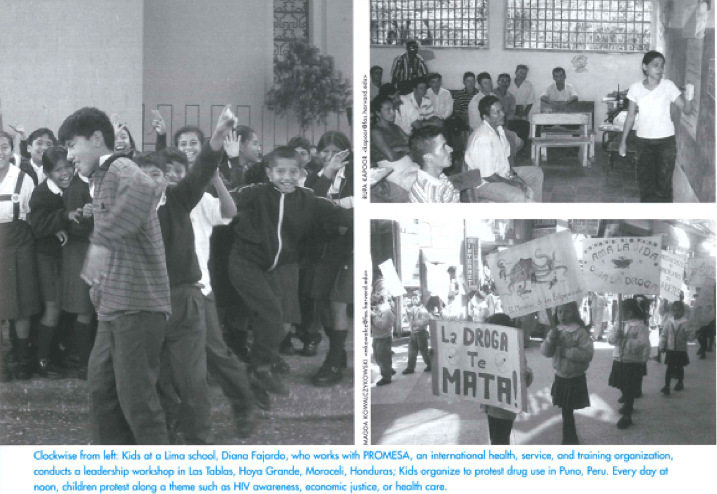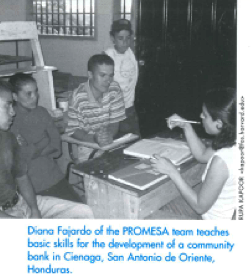Education for Democracy

The breakdown of some democratic regimes in Latin America in the 1970s challenged the widespread belief of many in the region that with education came democracy. This perceived relation between education and democracy was at the heart of the creation of systems of public education. In 1816, Argentine educator Domingo Faustino Sarmiento proposed the creation of “the popular school” so that children of different backgrounds would come together to be prepared as citizens of the newly independent American republics. He also warned that the expansion of education was a necessary condition for effective citizenship. His ideas extended to many countries in the region and were particularly influential in Chile, Argentina and Uruguay, the countries with the most established education systems and with the highest education levels. As democracy collapsed in these countries in the 1970s, many questioned the value of education in preserving democracy. This question is of renewed importance today as the shadows of authoritarianism have begun to appear again on the horizon of several Latin American countries.
Even though education by itself cannot directly change the economic, political, or social structures of a country, education can contribute to democracy and democratic citizenship in two specific ways. The first is by offering equal opportunities to children of different socio-economic and cultural backgrounds. In the last century, many Latin American nations have expanded access to school to accomplish this goal, and basic education is free and compulsory in all countries. However, that has not been enough. A second way in which education can contribute to democracy is by preparing citizens who know, understand, and choose democracy by teaching them specific knowledge, skills, and values or attitudes needed to become democratic citizens. While there is a rich tradition in Latin America of developing programs to teach students about human rights, peaceful conflict resolution, and democratic governance, many have been private initiatives of non-governmental organizations, implemented at a small scale, and of short duration. Governments initiatives to teach children about democracy have been limited to courses on Civic Education; but usually these are taught in highly theoretical form, in very authoritarian and traditional styles, and largely disconnected from the students’ daily lives and experiences (Villegas-Reimers, 1994). It is worth mentioning, also, that Civic Education without an emphasis on democracy has been successfully used by authoritarian regimes to support their undemocratic organizations and practices. For example, the Citizenship Education curriculum of the former Soviet Union and other countries such as China are good examples of effective Citizenship Education. However, they are curricula that prepare “good” citizens who understand that government is responsible for making decisions and creating rules and regulations, and that their role as citizens is only to obey. That type of education never taught them how to participate in their societies.
A democratic system works effectively when all people are willing and able to participate in the political, economic, governmental, and social processes of their communities and their societies, and when social and political structures are organized based on democratic principles that emphasize respect for individual human rights. While general education and civic education contribute to preparing citizens, more is needed. Citizens must develop democratic abilities and skills, moral values that reflect democratic ideals and principles, motivation to get involved and act, and knowledge of democracy, its principles and practices. Only then can they be fully willing and able to participate in their society’s democratic functioning. These skills, knowledge, and values must be taught explicitly in schools and supported openly before the younger generation of citizens can become likely to understand democratic ideals and behave democratically. This is especially true in societies with emergent or so called “fragile” democracies, where democratic processes are not easily witnessed in the everyday media or public practices of a number of social institutions. In such societies, children and adolescents are not routinely exposed to these processes.
EDUCATION FOR DEMOCRACY
People in societies that want to prepare citizens to believe in and think and behave like democratic citizens must commit to the explicit and purposeful process of teaching and promoting the development of democratic knowledge, skills, values and attitudes. This is known as education for democracy or education for democratic citizenship. And it is different from (although not unrelated to) democratic education, which refers to an education system that has a democratic structure and follows democratic processes; and different from the democratization of education, which refers to the opening of access to education to all members of a society.
An effective program of education for democracy teaches and promotes the development of specific knowledge, skills, and values or attitudes that are necessary to live in a democracy.
WHAT KIND OF KNOWLEDGE? KNOWLEDGE OF WHAT?
Democratic citizens must develop what John Patrick, a leading educator for democracy in the United States, calls the development of intellectual capital, and what South African educator Brenda Leibowitz calls civic literacy. That is, they must learn about what democracy is, how societies and governments are organized, how governments function, and about the history of their society. They must also have basic knowledge of economic, political, legal and social structures and systems, of how they work and function. They must know about the constitutions of their countries, and about universal human rights. In this time of international and global awareness, citizens must also know and understand international relations. They must learn how democracy and democratic processes and structures are created; how democracy works and how it is sustainable. Also, they must understand why societies choose democratic principles and organizations. Finally, they must learn and understand that in democracy, everyone’s voice must be listened to, that decisions are made by majority vote, and that the rights of the minority are to be respected and protected.
WHAT KIND OF SKILLS?
Individuals can only function effectively as democratic citizens when they have the skillsthat allow them to participate actively in society. They must know how to read and write, so that they can gather complex information, understand it, and participate in arguments and high-level decision-making processes effectively. Only with these skills well developed they will be able to participate in what Stotsky (1999) calls civic participatory writing. They must also know how to engage in true dialogue and processes of conflict resolution and negotiation—what D. Hess calls “discussions of controversial public issues” (“Teaching students to discuss controversial public issues.” ERIC Digest, Washington, D.C.: ERIC Clearinghouse for Social Studies).
They must learn how to cooperate, think critically and independently, and know how to evaluate pros and cons of alternative solutions to problems.
DEMOCRATIC VALUES
The values of democracy, those of respect and tolerance (both individual and political), responsibility, integrity, self-discipline, justice, freedom, and human rights, among others, are not innate human values. They are learned and must be taught as explicitly and clearly as democratic knowledge and skills are taught. This element of education for democracy is possibly the most controversial and difficult to plan and implement, as many fear that teaching values should not be part of school curriculum, but of family instruction and practices. However, democracy is founded on specific values that must be explicitly labeled, identified, practiced, and promoted in group-settings, not just in the family so that children learn that values are not just private and personal choices, but also choices that have public and social consequences.
It is inspiring to see the efforts that many emergent democracies, such as countries of the former Soviet Union and South Africa, have made in the past decade to educate their citizens about how to live in democracy. These societies have not only reorganized themselves and their institutional structures and processes to reflect working democracies. They have also developed and implemented strong curricula of education for democracy beginning in elementary schools, as they have realized that younger generations need to be taught how to live in this new system of governance. Many countries in Latin America have also supported the development of curricula at the elementary level that emphasizes education for democracy. Colombia, Paraguay and Mexico, among others, are good examples of such efforts.
Even in societies with traditionally strong democracies such as the United States, the tragic events of September 11, 2001 have pointed to the importance of supporting and promoting the explicit education of the younger generations to promote their understanding and knowledge of democratic practices. A strong curriculum that approaches democracy from the cognitive, behavioral and emotional point of view, and that is planned and implemented in developmentally appropriate ways is possibly the most effective way of preparing the next generation of democratic citizens and leaders. These are some suggestions for action:
The content of the curriculum must be carefully examined to include concepts and information necessary to understand democracy. It is not enough to ask children and adolescents to memorize concepts and other pieces of information out of a meaningful context. The curriculum must present an integrated and very practical perspective on democracy, what it is, how it is organized, its history, politics, etc.
Principles of human development should guide the development and implementation of the curriculum so that all activities are planned and implemented in developmentally-appropriate ways. For example, democratic principles are very abstract concepts, something that only older children might be able to understand well. However, they can be taught in very concrete ways so that even young children begin to grasp basic concepts and ideas that can then increase in complexity as the children move on within the educational system.
Teaching methods and practices should reflect democratic processes rather than authoritarian styles. Teachers should emphasize debates, dialogue, conversations, and projects that require group and individual work., etc. According to recent scholarly studies, some of the most successful strategies and methods to teach education for democracy include the use of case studies, service learning, experiential learning, and cooperative learning. Other successful methods use literature, international comparisons of cases and/or of Constitutions, discussion of controversial public issues, and civic writing (or writing publicly to advocate for a particular issue, candidate, law, regulation, etc.). All these techniques respond to individual needs and yet teach the individual to work in groups, to negotiate, advocate, listen to others, and to explain his or her point of view.
The school organization should be reflective of democratic structures. Students should learn about democratic structures in schools, the first institution with which they develop a relationship outside of their families. The structure of the schools should be such that students’ voices are listened to and taken into account in meaningful discussions and decisions that affect all members of the community.
The initial preparation of teachers and all processes that support their life-long process of professional development must begin to pay more attention to the role that teachers play in educating the next generation of democratic citizens and leaders. Few countries include in their teacher preparation curriculum education for democracy content, skills, or practices (Villegas-Reimers, 1994). And that needs to be changed as it is well known that in order for education reforms to be effective and successful teachers must be included both as objects and agents of change.

The development of instructional materials that support the contents and practices described above is essential to support the work that takes place in the classrooms.
Education for democracy is already a reality in many countries around the world. In some countries, this type of education occurs in all schools at a national level. In many others, a few schools have smaller projects for some of their students. Both are good signs that it can be done. In addition, a number of international organizations and partnerships that support these efforts are great allies in the process of planning, implementing, and strengthening existing programs (both in schools and in non-formal settings). In a 2000 seminar on the new Indonesian Civic Education, Charles Quigley discussed Civitas International as an example of the new global trends in civic education. Civitas gathers together about 90 centers around the world, including many in Latin America, and sponsors an international program called Civitas: An International Civic Education Exchange Program. The organization also hosts a website (www.civnet.org) that provides information, links to other web sites of interest, and a significant amount of materials and teaching resources. Other good examples of networks of organizations that work for education for democracy in Latin America are Conciencia (www.Concienciadigital.com), Participa: Cruzada por la Participación Ciudadana, and the Red Interamericana para la Democracia (www.Redinter.org); all are networks of organizations that support and promote the work of civil society in Latin America. Initiatives like these are signs that education for democratic citizenship can be carried out, and that it is a necessary component of the process of strengthening local, organizational, and national democracies.
Fall 2002
Eleonora Villegas-Reimers has a doctoral degree in Human Development from the Harvard Graduate School of Education and teaches at Wheelock College in Boston. She has done several studies on values education, civic education, and education for democracy in Latin America, including Civic education in the schools systems of Latin America and the Caribbean (Working Papers No 3. Education and Human Resources Division, Bureau of Latin America and the Caribbean, U.S. Agency for International Development. Washington, D.C.: Academy for Educational Development, 1994), cited in this article. She is currently writing a comparative review of the literature on these topics.
Related Articles
Editor’s Letter: Democracy
Ellen Schneider’s description of Sandinista leader Daniel Ortega in her provocative article on Nicaraguan democracy sent me scurrying to my oversized scrapbooks of newspaper articles. I wanted to show her that rather than being perceived as a caudillo
Battro Named to Pontifical Academy
Antonio M. Battro M.D., Ph.D. has been named to The Pontifical Academy of Sciences, the oldest science academy in the world, established by Galileo 400 years ago. Battro, Robert F. Kennedy…
Entre los panales y el poder
Cuando Jacqueline van Rysselberghe fue informada en Noviembre último que ella debería dejar su puesto como alcaldesa de Concepción, una de las ciudades mas grandes e…




